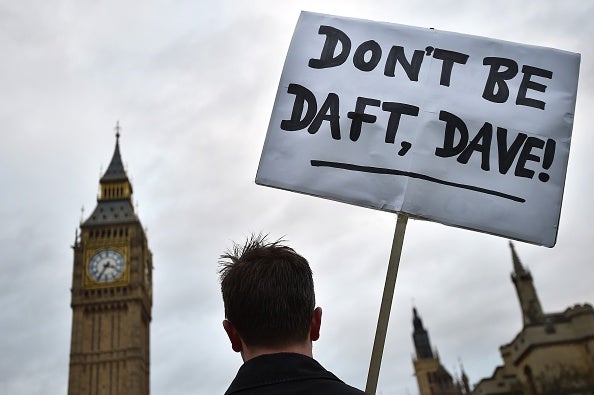The Independent's journalism is supported by our readers. When you purchase through links on our site, we may earn commission.
Syria air strikes: Why the Government should have invested war money into infrastructure, education and student support services
It is 'infuriating' that, on the same day the Government decided to bomb Syria, Jo Johnson announced funding for disabled students in higher education is to be cut, says the NUS international students' officer

Only hours before the House of Commons voted to extend its air strikes to the so-called ‘Islamic State’ targets in Syria on 2 December, there was another group discussing the same topic. In a cold concrete room on the first floor of Manchester Metropolitan Students’ Union, the National Executive Council (NEC) of National Union of Students (NUS) - the democratically elected decision-making body of the organisation which meets six times a year to pass policy in-between national conferences - was having its third scheduled meeting.
As the meeting coincided with the House of Commons’ on whether to militarily intervene in Syria or not, it seemed like a good opportunity to get an understanding what student representatives from all over the UK thought of this. It is worth mentioning very wide-ranging political standpoints and opinions are often found on NUS NEC, making it a rare possibility for all 46 NEC members to agree on controversial motions.
Nevertheless, the motion reading ‘Don’t Bomb Syria’ was proposed and, after delivering the speech in favour of the motion, I was surprised to see no-one had volunteered to speak against it. Although this was very promising, I was certain some of the members would be voting against it. To my amazement, every single NEC member voted in favour of the motion and against Britain engaging in yet another military intervention in the Middle East.
Read the full NEC emergency motion:
Of course, as student representatives, we were under no illusion this outcome would have changed the Common’s vote, particularly given the debates were already underway. However, we understood it was vital the voice of our seven million members - and much of the general public - was heard at such a crucial time. It was important to highlight how the issue of foreign intervention was dealt with by the student movement previously so we could fully understand how the landscape and public opinion amongst students had shifted over the past few years. As the motion points out: “During the 2013 Commons vote, NEC voted to adopt a stance of having ‘no position’ on British military intervention against Syria.”
Since the decision was made by Parliament last week to start the bombing campaign, there have been many conversations among student activists - and even students who wouldn’t normally engage in politics - about what we can do to stop it. The failures of Western intervention and the role Britain played in them still casts a heavy shadow on the conscience of much of the British population. Afghanistan, Iraq, and Libya, three of the military campaigns the UK has taken part in over the past few years, all seem to have contributed to the emergence of what is now known as Isis.
Earlier this year, the Washington DC-based Nobel Peace Prize-winning Physicians for Social Responsibility (PRS) released a landmark study concluding the death toll after ten years of the ‘War on Terror’ since the 9/11 attacks to be at least 1.3 million - and could be as high as two million. This research doesn’t include the ongoing civil wars in Yemen, Libya, and Syria which, arguably, are closely linked to the ‘War on Terror’ that has been waged on Iraq, Afghanistan, and Pakistan.

For students, and the younger generation in general, it is difficult to accept the Government’s commitment to spending an estimated £1 million per mission when it is clear it would achieve nothing but more death, destruction, and a growth in radicalisation in the region, and worldwide. It becomes yet more infuriating when, on the same day the Government decided to bomb Syria, the Department for Business, Innovation and Skills (BIS) published a written ministerial statement on disabled students’ allowances (DSA) where Minister of Universities, Jo Johnson, announced the Government is to cut its funding for disabled students in higher education.
The announcement to scrap student maintenance grants in July is also still an open wound for many. Given how challenging it has become to get a job post-graduation, the housing benefit cuts for under-25s is now just another one of many cuts students and young people have to struggle with.
The link between cuts to vital support services and the desire to wage never-ending pointless wars is one which has become increasingly evident. In light of the 2 December vote, the anti-war movement within the student movement will, once again, grow in strength and numbers, close to what it was in early 2003, and I have no doubt this growth will, not only work towards a world without war and bloodshed, but it will challenge the Government to invest that money in infrastructure, education, and support services which are so desperately needed.
Join our commenting forum
Join thought-provoking conversations, follow other Independent readers and see their replies
Comments